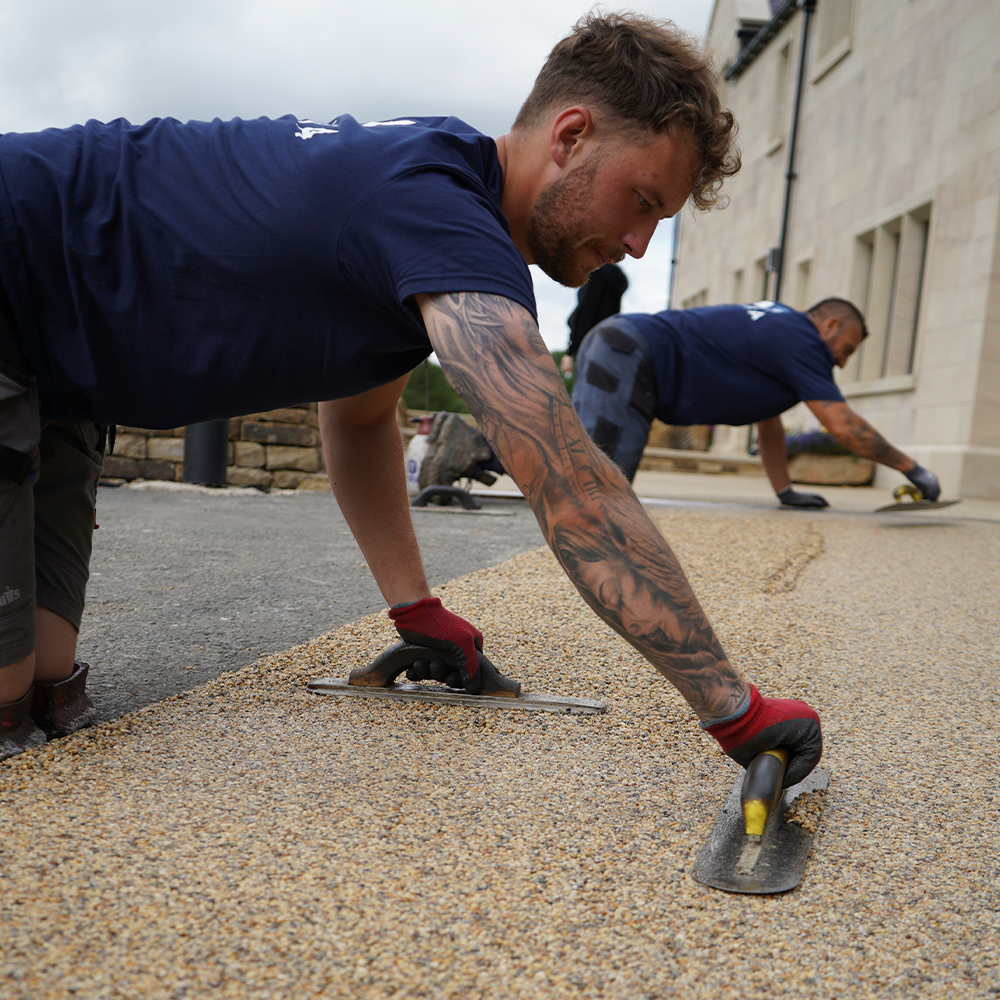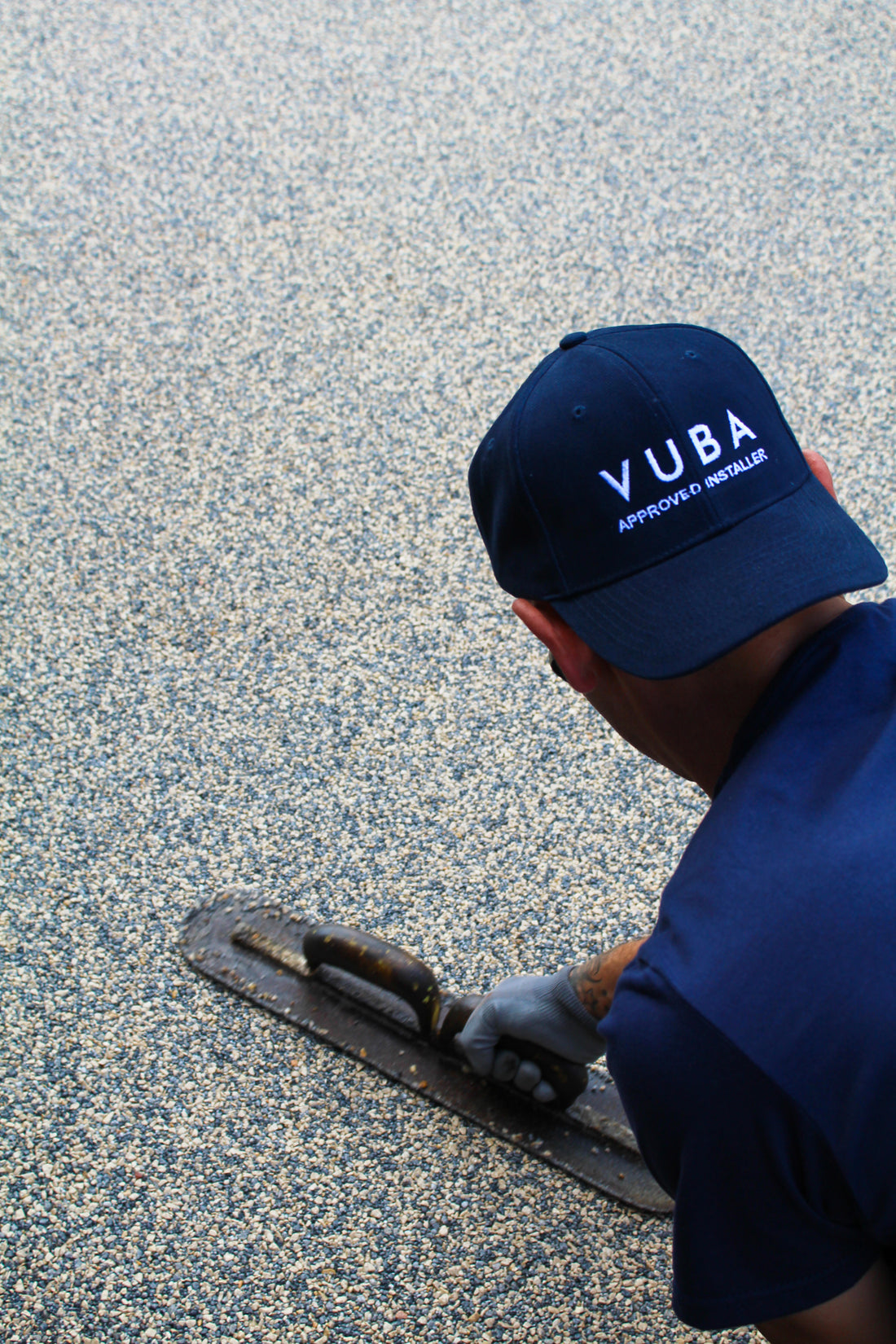
Technical Bulletins
The Vuba Laboratory
The Vuba Laboratory
Porous vs Non Porous Bases
In our Vuba Lab we tested the impact of a porous base vs a non porous base on the effects of moisture damage. This was to demonstrate and prove the theory that a porous base will contribute to the protection against moisture damage and significantly reduce the negative effects of moisture damage.
What are the typical effects of moisture damage?
If resin bound surfacing is affected by moisture in the curing process it can cause a decrease in strength and discolouration. The decrease in strength can often lead to break down of the surface and failure of the resin bound surfacing.
What tests did Vuba do?
- We laid a set of resin bound samples on a porous base and a set on a non-porous base and instantly severely moisture damaged the samples to simulate sudden heavy rainfall.
- In the porous base the water permeated through straight away compared to the non porous base where the water settles at the bottom of the resin bound surfacing above the sub base. We then left these to cure for 10 days which allows for a full cure for accurate strength tests.
- Once removed from the moulds we then used our Universal Testing Machine and performed 3 point bend tests to see the effects of the moisture damage on strength.

Conclusion
This is because the water can free drain through the base rather than sitting on the non porous surface and submerging the resin bound. The results prove that a porous base will help to protect against the effects of moisture damage and reduce the negative effects. This is why Vuba always recommends a porous sub base, specifically encouraging our new VubaMac Base System which is a SUDS compliant no dig resin bound system.
VubaMac is a urethane asphalt base course. Vuba’s SRM provides the base, and a layer of resin bound railway ballast is then mixed and spread on to the surface using a spazzle. The ballast is then flattened using a wetpour roller, and a topping layer of SRM applied. Vuba’s resin bound can be applied in the same day, creating a 50mm monolithically bonded polyurethane base and surface wearing course. More about VubaMac to come in our next update!

The Best Diluent Additive for your Sealer White Spirit vs Xylene
Diluents in your sealer
When sealing your resin bound projects, it is necessary to dilute your resin sealer kit with a diluent. There is a divided opinion in the industry regarding what should be used to dilute your sealer, Vuba recommend White Spirit whilst some others still recommend Xylene. Vuba took to the lab to show exactly why we use white spirit and not xylene in our resin sealer.
Why did we test this?
We’ve seen in the industry people raising the question about their resin bound surfacing breaking down even after applying a sealer, and continuing to deteriorate. Vuba’s recommended Sealer System doesn’t see this problem so we wanted to look into what was happening to give the best advice to our customers. When we heard some people used Xylene, of which we know breaks down resin bound dramatically, we theorised that this would be the problem. Keen to keep improving the industry, the Vuba Lab Team ran some tests.
What tests did Vuba do?
We took a set of samples and sealed them with our sealer using White Spirit as the additive for dilution, then another set exactly the same but with Xylene as the additive. We left the sealer to cure and assessed the visual results on the samples. Next, once removed from the moulds we then used our Universal Testing Machine and performed 3 point bend tests to see the effects of the sealer additives on strength.

The Chemistry
Xylene is more volatile than white spirit, and so evaporates more quickly leaving a stronger surface. So, if you are sealing a non-resin surface, we’d actually recommend Xylene. However, this same Xylene attacks the covalent bonds in the resin bound beneath, significantly weakening the system. For that reason, you should never use Xylene in your sealer when it is being applied on to a resin bound base. You can test this for yourself. Place a resin bound sample submerged in Xylene and you will be able to pick out the stones in an hour. This will not happen if submerged in White Spirit.

Find out more from our technical team:
Milly Sheffield | Technical, Research and Development
+44 (0) 7940 295105
milly.sheffield@vubagroup.com
vubaresinproducts.com









